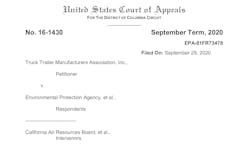Court grants trailer manufacturers stay of NHTSA GHG2 rule
Trailer manufacturers and customers wanting to place orders for trailers to be built early next year can breathe a little easier—for the time being. The US Court of Appeals for the D.C. Circuit on Sep. 29 granted the request for a stay of the Jan. 1, 2021 implementation date for the trailer portion of the federal fuel efficiency regulation known as GHG2.
The Truck Trailer Manufacturers Association, which has taken the US Environmental Protection Agency and National Highway Traffic Safety Administration to court challenging the rule, called the stay “welcome news” for trailer manufacturers.
“This stay means they will be able to continue receiving orders and manufacturing trailers with certainty of which rules are in effect, while we await the final decision from the court on the legality of the both the NHTSA and EPA rules,” TTMA said in a statement.
The 2016 joint EPA-NHTSA regulation—formally “Greenhouse Gas Emissions and Fuel Efficiency Standards for Medium- and Heavy-Duty Engines and Vehicles—Phase 2”—mandates new trailers must apply technologies such as low rolling resistance tires, aerodynamic devices, etc. to improve the fuel efficiency of a tractor-trailer combination unit.
Trailer manufacturers argue, however, that such technology does not provide a universal benefit, given the variety of equipment types that qualify as ‘trailers.’ Trailer buyers should be able to spec the equipment for the greatest benefit, as they do now, and should not be forced to buy costly add-ons that, in some instances, could actually be counterproductive in the applications for which the trailers are designed and built, TTMA contends.
With the initial TTMA filing in late 2016, the EPA agreed to review the rule and the court granted a stay of EPA's Jan. 1, 2018 implementation. As that review dragged into 2020 and with its members facing the NHTSA deadline, TTMA opted to push ahead for a resolution.
Oral arguments were made before the court earlier this month. TTMA insists that EPA, under the Clean Air Act, can only regulate “self-propelled” vehicles—which trailers are not—and therefore the trailer portion of the EPA rule should be thrown out. And, if the EPA rule is thrown out, the NHTSA rule cannot stand on its own as written.
The government, however, argues that the tractor-trailer combination is designed to operate as a single unit and therefore trailers qualify for the regulation. But even if the EPA rule is vacated, NHTSA’s rule should stand because any connection to the EPA rule was simply to remove bureaucratic redundancy and simplify compliance.
About the Author
Kevin Jones
Editor
Kevin has served as editor-in-chief of Trailer/Body Builders magazine since 2017—just the third editor in the magazine’s 60 years. He is also editorial director for Endeavor Business Media’s Commercial Vehicle group, which includes FleetOwner, Bulk Transporter, Refrigerated Transporter, American Trucker, and Fleet Maintenance magazines and websites.
Working from Beaufort, S.C., Kevin has covered trucking and manufacturing for nearly 20 years. His writing and commentary about the trucking industry and, previously, business and government, has been recognized with numerous state, regional, and national journalism awards.

